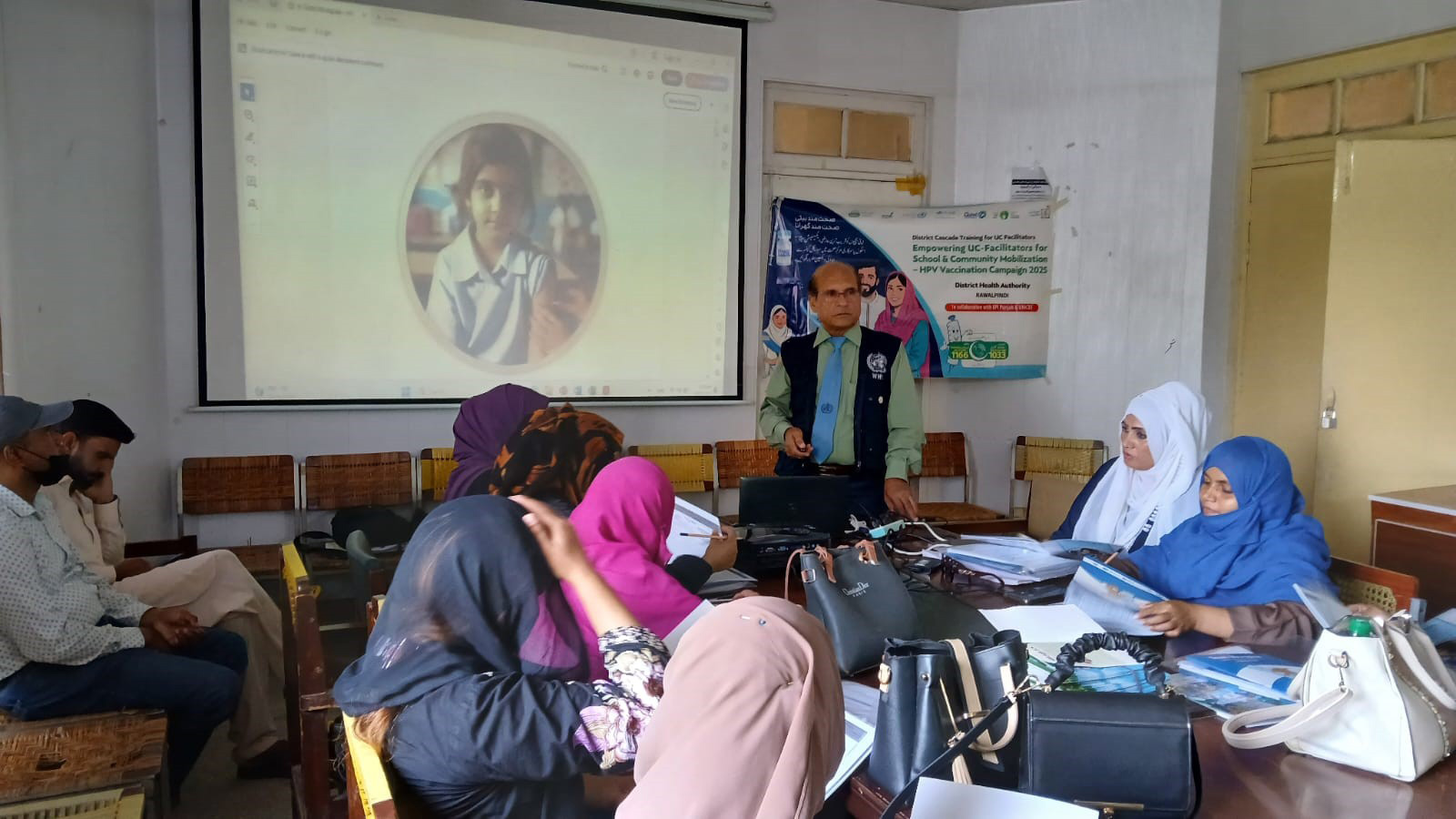The introduction of the human papillomavirus vaccine aligns with the World Health Assembly’s Global Strategy to eliminate the third most frequent cancer among women in Pakistan.
Health workers attend a WHO-led training for the introduction of the HPV vaccine in Punjab, Pakistan. Photo credit: WHO13 August 2025, Islamabad Pakistan – The World Health Organization (WHO) is partnering with the Government of Pakistan to train over 49 000 health workers for the upcoming introduction of the human papillomavirus (HPV) vaccine planned from 15 to 27 September. The campaign will be a historic milestone to prevent cervical cancer in the country, targeting for the first time 13 million girls aged 9 to 14 years across Punjab, Sindh, Islamabad Capital Territory and Pakistan-administered Kashmir.
Cervical cancer is the third most prevalent cancer among women in Pakistan. With a female population of 73.8 million aged 15 years and older at risk, the country reports over 5 000 new cases of cervical cancer in women annually. Almost 3200 of them (64%) die from the disease. The mortality rate, one of the highest in South Asia, is primarily attributed to delayed diagnoses and limited access to screening programs.
A recent WHO study conducted across 18 healthcare facilities in Pakistan (2021-2023) documented 1580 cases of cervical cancer, suggesting there is a significant underestimation of the disease burden due to low screening rates and lack of a national cervical cancer registry. Modelling data indicate that, in the absence of vaccination, the cervical cancer disease burden in Pakistan will increase at least 3-fold over the next 7 decades.
With funding support from GAVI, The Vaccine Alliance, the cascade training sessions will be conducted until the end of August, with a focus on microplanning and essential skills for vaccinators, doctors, social mobilizers, and data entry operators.
WHO’s support for the campaign also includes technical guidance for the conceptualization, planning, data analysis, readiness assessments and capacity development in close collaboration with partners, the Pakistan Federal Directorate of Immunization (FDI) and its Expanded Programme on Immunization (EPI) at the federal and provincial levels.
“This HPV vaccination campaign is more than just a public health intervention; it is an investment in the health and potential of our daughters,” said Dr Soofia Yunus, Director General, Federal Directorate of Immunization (FDI). “By embracing this vaccine, Pakistan is taking a big step to protect its future from cervical cancer.”
The campaign aligns with the World Health Assembly’s Global Strategy for cervical cancer elimination target – that, by 2030, 90% of girls are fully vaccinated with the HPV vaccine by 15 years of age, 70% of women are screened, and 90% of women with pre-cancer or invasive cancer receive treatment.
“We are witnessing a truly transformative moment for public health in Pakistan. WHO is proud to stand with Pakistan and its Federal Directorate of Immunization in championing this critical health measure, ensuring that every girl has the chance to access lifesaving vaccines and lead a life free from the threat of cervical cancer,” said WHO Representative in Pakistan Dr Dapeng Luo.
The phased introduction of the HPV vaccine will pave the way for its eventual rollout in other provinces and areas (including Khyber Pakhtunkhwa in 2026, and Balochistan and Gilgit-Baltistan in 2027), further strengthening Pakistan’s routine immunization program. WHO extends its gratitude to Pakistan’s Ministry of Health, the FDI and partners for their unwavering commitment to protect girls from cervical cancer and build a healthier future for all.
For additional information, please contact:
Maryam Yunus, National Professional Officer – Communications, WHO Pakistan,
This e-mail address is being protected from spambots. You need JavaScript enabled to view it
(copying
This e-mail address is being protected from spambots. You need JavaScript enabled to view it
)
José Ignacio Martín Galán, Head of Communications, WHO Pakistan,
This e-mail address is being protected from spambots. You need JavaScript enabled to view it
About WHO
Founded in 1948, WHO is the United Nations agency that connects nations, partners, and people to promote health, keep the world safe and serve the vulnerable. We work with 194 Member States in 150+ locations – so everyone, everywhere, can attain the highest level of health. For more information, visit https://www.emro.who.int/countries/pak/index.html. Follow WHO Pakistan on Twitter and Facebook.
